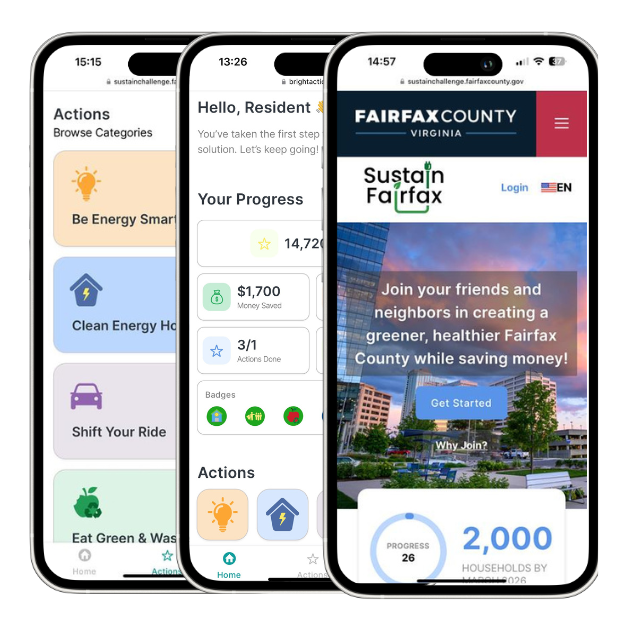Written by the Sustain Fairfax Team
Looking to save money, reduce stress, and live more sustainably in Fairfax County? Whether you're a parent, a professional, or just trying to make ends meet, these easy tips will help you cut costs, shrink your carbon footprint, and make a positive impact—without turning your life upside down.
Discover how the Sustain Fairfax Challenge can help you go even further—with fun, trackable actions and helpful guidance at every step.

Doing Good for Your Community Won’t Break the Bank
We're all looking for clever ways to cut costs in today's economy. What if some of your choices could also help protect the planet—and make Fairfax a cleaner, healthier place to live? You don't need to overhaul your lifestyle to start living more sustainably. Climate-friendly actions are surprisingly simple and can save you hundreds of dollars a year.
Here are five easy, practical tips to help you live greener, save money*, and feel good about your impact.
LEDs use up to 90% less energy than traditional bulbs and last up to 25 times longer. That means fewer replacements and lower electricity bills.
💡 Savings: Over $200 per year for the average household that replaces 30 incandescent bulbs.
Instead of driving alone daily, consider smarter commute choices like telecommuting, carpooling, taking the train or, Metrorail, or riding the bus. These alternatives reduce your carbon footprint and can lead to significant savings.
Mixing and matching these options on different days can reduce transportation costs and ease stress from daily travel.
🚗 Savings: Over $1,000 per year with combined alternative commuting options.
Did you know your electronics still draw power when they're "off"? Unplugging devices not in use—or using a smart power strip—can reduce wasted energy.
🔌 Savings: Up to $200 per year on your electric bill.
Everything we buy — from phones to fashion — uses energy and resources to make. By purchasing only what you need, you not only save money but reduce pollution, and conserve natural resources.
Try buying secondhand, renting instead of owning or choosing quality items that last. Avoid fast fashion and look for brands that use natural materials or sustainable practices. Before you buy, ask yourself: Do I really need this? Will I use it often?
🛍️ Savings: Up to $850 annually by cutting back on unnecessary purchases.
You don't need to give up meat entirely, but reducing your red meat consumption can make a big impact. Producing beef uses significantly more water and emits more greenhouse gases than plant-based foods. Try a "Meatless Monday" or substitute chicken or fish a few times a week.
🥩 Savings: $260 or more yearly by reducing meat in your diet.
If you're ready to keep the momentum going, there's an easy way to take the next step.
Ready to Do Even More?
 The five tips above are just the beginning. The Sustain Fairfax Challenge website includes dozens of simple, practical actions you can explore—everything from reducing food waste to saving energy at home.
The five tips above are just the beginning. The Sustain Fairfax Challenge website includes dozens of simple, practical actions you can explore—everything from reducing food waste to saving energy at home.
The Sustain Fairfax Challenge guides you step-by-step with helpful tips, makes progress easy to track, and even rewards you with fun digital badges. Whether you want to start small or go big, you'll find the support you need to build lasting habits that fit your lifestyle.
✅ Browse dozens of real-life sustainability actions
✅ Track your progress with ease
✅ Compete or collaborate with others in your community
Small Actions. Big Impact. Sustain Fairfax.
🌱 Explore the actions and join the challenge today at sustainchallenge.fairfaxcounty.gov.
Together, we can build a cleaner, greener, healthier Fairfax—one action at a time.
*Cost savings may vary per household. To get personalized savings amounts, create a Sustain Fairfax challenge account and fill out a household profile.
Climate Matters is the blog of Fairfax County’s Office of Environmental and Energy Coordination, where we share stories, insights and information related to climate change and environmental sustainability. Posts are written by knowledgeable and passionate OEEC staff members and guest authors. To read all blog posts, visit Climate Matters.

